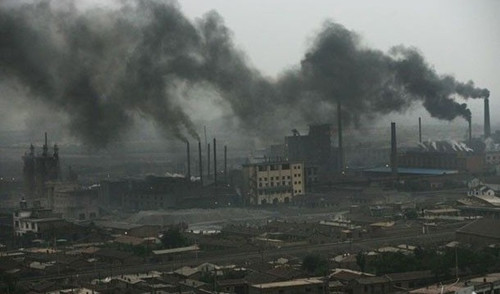If you live in America there's a 41% chance you'll get cancer.
如果住在美國(guó),你將有41%的幾率患上癌癥。
Heart disease will kill one out of three Americans.
每三個(gè)美國(guó)人中就有一人將死于心臟病。
We take prescription drugs to deal with these problems, but medical care is the third leading cause of death behind cancer and heart disease.
我們以為吃處方藥就可以解決問(wèn)題,但醫(yī)療是僅次于癌癥和心臟病的第三大死亡主因。
We're told everything can be solved by throwing money at scientists so they can discover a pill to make our problems go away.
我們被告知只要付錢給科學(xué)家就可以解決一切問(wèn)題,這樣他們就能研發(fā)藥物趕走我們的病。
But the drug companies and cancer societies rely on our suffering to make a profit.
但醫(yī)藥公司和癌癥協(xié)會(huì)正因?yàn)槲覀冿柺芗膊≈嗖庞欣蓤D。
We think we're running for a cure, but really we're running away from the cause.
我們以為跑步就能遠(yuǎn)離疾病,但實(shí)際上我們卻在逃離問(wèn)題的根源。
Our body is a product of what we consume and the food we eat is designed purely for profit.
吃什么樣的東西就會(huì)有什么樣的身體,而我們的食品不過(guò)是牟利的工具。
We fill ourselves with toxic chemicals.
我們把有毒化學(xué)添加劑塞入自己的身體。
The bodies of animals infested with drugs and diseases. But we don't see this.
我們吃的動(dòng)物已經(jīng)被藥物和疾病感染,但是我們卻什么都看不見。
The small group of corporations that own the media don't want us to.
那些掌控媒體的企業(yè)小集團(tuán)不讓我們看到。
Surrounding us with a fantasy we're told is reality.
我們活在一個(gè)被我們視為真實(shí)的幻象世界里。
It's funny to think humans once thought the earth was the center of the universe.
有趣的是,人類曾以為地球是宇宙的中心。
But then again, now we see ourselves as the center of the planet.
但現(xiàn)在我們又妄想自己是地球的中心。

We point to our technology and say we're the smartest.
我們指著我們的科技成果囂張地宣布我們是最聰明的物種。
But do computers, cars, and factories really illustrate how intelligent we are?
但是電腦、汽車、機(jī)器人真的能夠證明我們多聰明嗎?
Or do they show how lazy we've become.
還是揭露了我們變得有多懶惰?
We put this “civilized” mask on. But when you strip that away what are we?
我們戴著這個(gè)美其名曰“文明”的面具,但當(dāng)面具被摘下時(shí)我們是什么?
How quickly we forget only within past hundred years did we allow women to vote; allow blacks to live as equals.
這么快我們就忘了“允許女性參與投票”、“承認(rèn)黑人和我們平等”這些轉(zhuǎn)變也不過(guò)是近100年的事情。
We act as if we are all-knowing beings, yet there is much we fail to see.
我們表現(xiàn)的好像自己全知全能,但是我們沒有看到的還有太多。
We walk down the street ignoring all the little things. The eyes who stare. The stories they share.
我們走在街上無(wú)視那些渺小的事物,那些看著你眼睛、急于分享的故事。
Seeing everything as a background to 'me'.
一切都是襯托自己的背景。
Perhaps we fear we're not alone. That we are a part of a much bigger picture.
可能是我們擔(dān)心自己不再獨(dú)一無(wú)二,擔(dān)心自己只是滄海一粟。
But we fail to make the connection.
但我們沒有同其他生命建立聯(lián)系。
We're okay killing pigs, cows, chickens, strangers from foreign lands.
我們覺得殺豬、牛、雞乃至其他國(guó)家的陌生人沒有問(wèn)題。
But not our neighbours, not our dogs, our cats, those we have come to love and understand.
卻又不允許鄰居,貓狗,那些我們理解和愛的人被傷害。
We call other creatures stupid yet we point to them to justify our actions.
我們聲稱其他生物很愚蠢,卻又將槍口對(duì)準(zhǔn)他們來(lái)為自己的行為辯護(hù)。
But does killing simply because we can, because we always have, make it right?
但僅因?yàn)闅⒙驹谖覀兡芰Ψ秶鷥?nèi)、常常伴隨我們就代表了殺戮是正當(dāng)?shù)膯幔?/div>
Or does it show how little we've learned.
還是說(shuō)它體現(xiàn)了我們有多無(wú)知?
That we continue to act out of primal aggression rather than thought and compassion.
我們的行為總帶著原始人般的侵略性,而不是文明人該有的理智和慈悲。
One day, this sensation we call life will leave us.
總有一天,這種被稱作生命的感知能力將離開我們。
Our bodies will rot, our valuables recollected.
我們的軀體將會(huì)腐爛,我們的財(cái)物將變成記憶。
Yesterday's actions all that remain.
昨天的一切情節(jié)未曾改變。
Death constantly surrounds us, still it seems so distant from our everyday reality.
死亡雖然不斷地圍繞著我們,但又好像與我們的日常生活相去甚遠(yuǎn)。
We live in a world on the verge of collapse.
我們活在一個(gè)瀕臨崩潰的世界。
The wars of tomorrow will have no winners.
明天的戰(zhàn)爭(zhēng)將沒有勝者。
For violence will never be the answer; it will destroy every possible solution.
因?yàn)楸┝τ肋h(yuǎn)都不能成為答案。暴力只會(huì)毀滅每一個(gè)可能的答案。
If we all look at our innermost desire, we will see our dreams are not so different.
如果每個(gè)人都能靜下心來(lái)審視自己內(nèi)心最深處的渴望,就會(huì)發(fā)現(xiàn)我們的夢(mèng)想并非那么天差地別。
We share a common goal. Happiness.
大家都有一個(gè)共同的目標(biāo)——快樂(lè)。
We tear the world apart looking for joy, without ever looking within ourselves.
為了尋求享受,我們把這個(gè)世界折磨的支離破碎,卻從未嘗試審視自己的內(nèi)心。
Many of the happiest people are those who own the least.
最快樂(lè)的人往往是擁有物質(zhì)最少的人。
But are we really so happy with our iPhones, our big houses, our fancy cars?
但我們有了iphone、豪宅、靚車之后就真的會(huì)快樂(lè)嗎?



